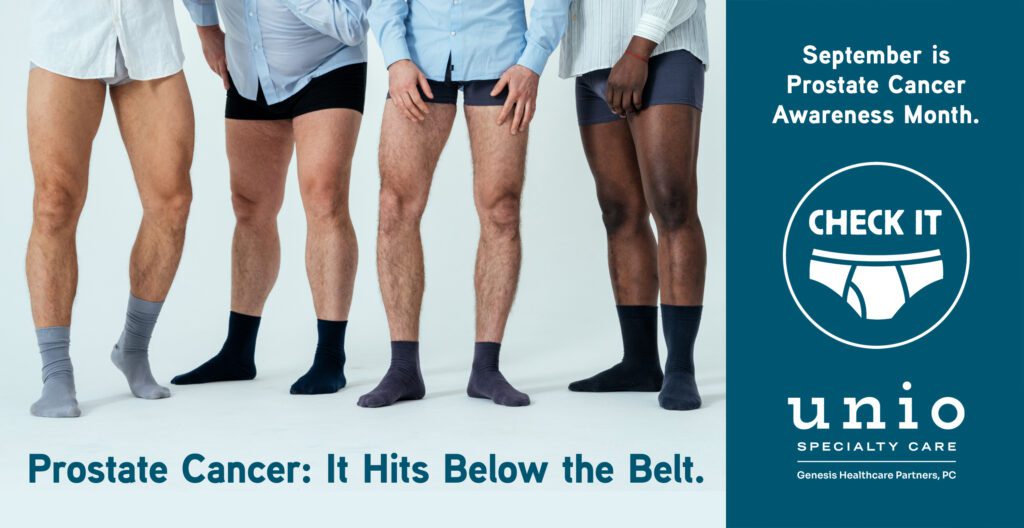September is Prostate Cancer Awareness Month
Take Charge of Your Health This September

September is Prostate Cancer Awareness Month, a time dedicated to educating men and their loved ones about the importance of early detection and treatment. At Unio Specialty Care, our goal is to empower men with the knowledge and resources they need to make informed decisions about their health.
Why Prostate Cancer Awareness Matters
Prostate cancer is the second most common cancer in men. According to the American Cancer Society, more than 250,000 men are diagnosed each year in the United States alone. The good news is that when caught early, prostate cancer is highly treatable.
Raising awareness helps men:
- Understand their personal risk factors (age, family history, race).
- Learn about the importance of early screening.
- Access information on modern, less invasive treatments.
- Feel confident discussing prostate health with their doctors and families.
By spreading awareness, we can save lives and improve quality of life for men at risk.
Understanding Risk Factors
Not every man has the same level of risk. Some of the most common risk factors include:
- Age: Most cases are diagnosed after age 50.
- Family History: Having a father, brother, or son with prostate cancer doubles your risk.
- Race: African American men face a higher risk and often develop prostate cancer at a younger age.
- Lifestyle: Diet, exercise, and overall health may influence risk.
Knowing your risk profile can help determine the right time to start screening.
When to Get Screened
Screening guidelines vary, but experts recommend:
- Men aged 50 and older: Discuss screening options with your doctor.
- High-risk men (African American or family history): Start the conversation at age 40–45.
- PSA Test and DRE: These simple tests can detect early warning signs, long before symptoms appear.
Early detection means more options and better outcomes.
Advanced Diagnostics and Treatments at Unio Specialty Care
At Unio, we provide comprehensive care across every stage of prostate health:
- Screening & Diagnosis
- PSA blood tests
- Digital rectal exams (DRE)
- MRI fusion imaging
- Prostate biopsies when necessary
- Treatment Options
- Active Surveillance for low-risk cases
- Minimally invasive surgery using robotic technology
- Radiation therapy, including advanced precision techniques
- Prostatic Artery Embolization (PAE) for benign prostatic hyperplasia (BPH)
- Innovative therapies tailored to your diagnosis and lifestyle
- Supportive Care
- Nutritional guidance
- Counseling and survivorship programs
- Long-term monitoring
We are here to guide you every step of the way.
7 Key Facts Every Man Over 50 Should Know About Prostate Cancer
Awareness is the First Step to Prevention
Did you know prostate cancer is the most common cancer among men in the U.S.? Early detection can save lives — but too often, men put off learning the facts until it’s too late.
That’s why our physicians at Unio Specialty Care have created a simple, easy-to-read guide: “7 Key Facts Every Man Over 50 Should Know About Prostate Cancer.”
Take charge of your health today. Download your free guide now.
By submitting this form, you agree to receive occasional email updates with information and resources related to colon cancer screening. You can unsubscribe at any time.
Symptoms to Watch For
Many men don’t realize that prostate cancer may not cause noticeable symptoms at first. Still, it’s important to be aware of changes, such as:
- Difficulty starting or stopping urination
- Weak or interrupted urine stream
- Frequent urination, especially at night
- Blood in urine or semen
- Erectile dysfunction
- Pain in the hips, back, or chest (advanced cases)
Even if these symptoms turn out to be something else, they should be evaluated by a doctor.
How to Take Action This Month
- Talk to Your Doctor about your risk factors.
- Schedule a Screening if you are over 50, or younger if you are high risk.
- Encourage Loved Ones to do the same — brothers, fathers, friends.
- Stay Informed about the latest advances in care and treatment.
Taking action today could save your life or the life of someone you love.
